Book II, Chapter 8: The Four Bankers from Lübeck
List of Chapters | Previous Chapter
The revelation concerning the ostler and his wife made it difficult for Hermann to feel at ease in the presence of either. The following afternoon he brought firewood into the inn’s kitchen; and, when Monika asked if he wanted to sample the braised ham hocks she had been preparing, Hermann blushed and found an excuse to hasten away.
For the sake of Walter, he made an effort to appear relaxed in the evenings when Benedikt read from the Fontaine novel. But he could not follow the thread of the story and was thinking of other things. Benedikt would not have admitted to murdering a judge unless he thought I harbored an even graver secret. How much does the man know about me? Where did he get his information?
It pricked at Hermann’s conscience that, ever since fleeing the workhouse, he had neglected his prayers and devotions. For as long as he could remember his faith had been his lodestar. It had shaped and molded him—given meaning to every aspect of his life. So it had cut deeply when Walter had complained that the way Hermann crossed himself, pronounced his ‘O’s in Gott, and invoked the Virgin Mother not only drew unwanted attention to them both, but made it obvious that Hermann was a Catholic simpleton from der gottesfürchtige Süden (the God-fearing South).
At the Eltzbacher Coach Inn no one seemed to pay much heed to religious matters. Monika and Benedikt treated each Sunday like any other workday, albeit a less onerous one. According to Benedikt, the Eltzbachers observed Shabbat “from time to time” in the privacy of their own cottage, but only rarely commemorated the biblical holidays. Frau Eltzbacher donated to a reformist organization in Cologne that sent her journals full of articles inspired by the writings of a rabbi in Berlin named Abraham Geiger.
—Walter and Monika laughed at an incident in the novel. The orphan leaned his head on the woman’s shoulder, and Hermann smiled to see the boy so happy. I could leave him here. Benedikt and his wife would take care of him. But what if the ostler is mad? That horrible experience in the judge’s house, if true, may have corrupted him spiritually. What if the man is wanting me to leave, so that he can do something unspeakable to the child?
Monika looked at Hermann as if she read his thoughts and resented the imputation.
“Of course she would resent it,” Hermann said aloud. “She’s his wife.”
“What?” Benedikt asked.
Monika and Walter glanced at each other in confusion.
“Nothing,” Hermann replied. “I’m tired. I’m going to bed.”
Benedikt closed the book and set it aside. Hermann walked down the corridor to his bunk room and stood inside of it, facing the door. He listened to the muted voices mumbling their goodnights. I’ve killed the evening. What made me say that?
Walter stopped in front of Hermann’s room.
“Are you alright, Papa?” the orphan asked.
“I had a son,” Hermann whispered. “He’s dead. I was never your father.”
The boy refused to look away but his lower lip trembled. He replied in a voice barely audible. “I know. But we have to pretend. Don’t we? All part of the act.”
Hermann nodded his head miserably.
“Did one of the wild dogs bite you in the stables the other night?” Walter asked.
“No. Why?”
“You’ve been acting strangely.”
“I’ll feel better in the morning.” Walter was about to leave when Hermann seized the boy’s wrist and fell to his knees. “I don’t know why I spoke to you in that manner. I take it back. You know that I love you as if you were my own son.”
Walter shrugged his shoulder. Tears welled in his eyes. He touched Hermann’s forehead and said, “You can’t let the monster come back.”
Monika extinguished the lantern in the hall. The upper landing was plunged into darkness. Hermann wondered if she had overheard their conversation.
On the evening of December 12, 1870, Hermann and the ostler sat across from each other in the worn-out chairs flanking the coach inn’s fireplace. Both were exhausted. Four bankers from Lübeck were finishing up their supper at the long table that dominated the center of the room. The four were discussing the weather, road conditions and time-tables tacked to the notice board by the door.
Monika brought her husband a second tankard of beer before heading back to the kitchen.
The ostler had been drunk for most of the day. Before he and Hermann left the carriage house that morning, he took two pulls from a bottle of Steinhäger, which he had picked up in the village. He told Hermann that the juniper liquor fortified his lungs against the cold. When Hermann returned to the carriage house that afternoon, the bottle stood empty on the table.
Benedikt’s speech was slurred and he was gabbling in an Austrian accent, which Hermann presumed was the ostler’s way of mocking him. Walter joined Benedikt and Hermann by the fire once he had served the guests their main course.
“Papa,” he said, “I want to work with the horses because—”
“Excellent!” Benedikt cut him off. “You can help us on Pfinsta, because the company in Dortmund will be sending three horses that day.”
“What?” Walter asked.
Hermann cocked his head when the ostler used the Tyrolean term for Thursday. “Donnerstag,” Hermann told Walter.
“Yes, Donnerstag.” The ostler wiped his mouth. “You can help us then, Florian.”
The boy walked away, bewildered.
Benedikt spilled foam on his chest and wiped it off. “Do you know what her name means?”
“Whose name?” Hermann asked.
“Frau Eltzbacher’s—Elischewa. Do you know what it means?”
“No.”
“It’s Aaron’s wife.”
“Elizabeth?”
“Yes. It’s a Hebrew phrase, meaning ‘abundance is my God’; or possibly ‘an oath is my God.’ Your mother’s name, Ilse, is a contracted form of it.”
Hermann sat bolt upright.
Benedikt lifted the lid of his krug and took another swig. “It’s funny how your eyes reflect the firelight like a wolf’s?”
“What did you say to me?” Hermann asked.
Benedikt’s head bobbled. His cheeks were ruddy. “I said your eyes reflect the firelight like a wolf’s.”
Hermann’s nostrils flared. “No. What did you say before that?”
Frau Eltzbacher appeared on the staircase and asked Hermann to fetch water from the well out back. He rose and seized the pail by his chair as the ostler burst into tears. By the time he returned, Benedikt was gone. He carried the pail upstairs and set it on the wooden hutch midway down the corridor. In the cupboard underneath were cups and a ladle, so the guests could quench their thirst in the night.
At the bottom of the staircase, Hermann found Monika.
“Where’s your husband?”
She wiped her hands on a towel. “He mentioned that he had spoken unkindly to you. He said that he was not feeling well and returned to the carriage house.”
“He’s drunk.”
“I know.”
“If you knew, why did you bring him another beer?”
She looked at him, earnestly. “Moritz, you’ve been here for less than two months. You don’t know anything about my husband or what he has been through. . .”
And yet I do, he thought. But he said nothing in reply. Monika had tried so hard to foster an atmosphere of companionship and domestic conviviality among the four residents of the carriage house. I’m being unfair to her. I’ll confront Benedikt when he’s sober.
That night, the temperatures plummeted and the miry roads turned to iron. The bankers were unable to depart the next morning for the simple reason that the coach never arrived. It had been canceled. By midday the sun melted the ice. Elischewa told the bankers that she was confident they would be able to depart on Wednesday’s packet, though it would mean overnighting in Cronenberg. She waived their fee for the second night, but they insisted on paying it as a matter of honor.
Benedikt did not emerge from his room all day on Tuesday. It was up to Hermann to feed and water the horses. Monika and Walter were preoccupied in the coach inn until the afternoon. Once Hermann had exercised the horses, he returned to the carriage house and ascended the steps. He removed his boots so as not to track mud and snow on the rugs in the living room and corridor. The rugs were for insulation more than décor. They prevented cool air from blowing up through the cracks between the floorboards.
Hermann placed his boots on the mat and walked in his socks to the bedroom where Monika and Benedikt slept. Without knocking, he twisted the knob. But the door was bolted shut from the inside. He put his ear against the wood and heard the ostler snoring. From the window by the potbelly stove he glimpsed Walter and Monika crossing the yard on their way back from the inn.
That evening, Monika cooked a small dinner of potatoes and onions. When Hermann and Walter had completed their meal, they retired to their rooms. Monika cleaned up. When she was done, she rapped on the bedroom door and Benedikt let her in.
On Wednesday morning the sun had not yet risen when Hermann stepped out of his room. He padded down the corridor, wrapped up in a woolen blanket. Monika and Walter sat together at the table, breakfasting on mett and brötchen. Monika had stuck a candle in the empty Steinhäger bottle and converted it into a table lamp. By the flickering flame they ate.
“Benedikt will be gone for most of the day,” Monika commented vaguely. “He’s taken the Eltzbachers’ horse to Kohlendorf. He said he needs supplies from the tack shop. He told me to remind you that the stallion will be departing with the packet this afternoon.”
“I need to talk to him,” Hermann said.
Neither Walter nor Monika replied. The boy chewed his food and contemplated the peeling label on the bottle. Monika withdrew into her room to prepare for the day.
The sun hugged the barren horizon that afternoon and was obscured behind a wispy bank of snow fog. The packet from Hamburg arrived with mail bundles secured to the roof by ropes. Hermann led the stallion out of the stables. By the time he made it to the front of the inn, the driver had unharnessed the mare that would be staying behind. Hermann took the reins and led her away. The coachman handed Elischewa a receipt for her to sign.
The only passenger in the coach stepped down out of it, and asked if a room was available because he had been sitting in the coach for over 10 hours and could not bear the jostling any longer. Elischewa confirmed that there was room, and asked the man to follow her inside.
The new arrival had a brush mustache and paid for one night. He told Elischewa that he wanted to take his meal in his room because he was tired. Elischewa conveyed his request to Monika, who went to the kitchen and heated up the leftover kidneys from two nights ago. She garnished the plate with pickled cucumbers and placed it on a tray with black bread and a pot of lard. She carried the tray upstairs and left it on the floor in front of the man’s room, knocking on the door to signal the meal was ready.
Earlier that day, the bankers had assembled their luggage in the common room. They had a strongbox, which the two youngest men carried outside between them. Both were bundled up to their chins since they would be riding on the plank at the back of the vehicle to make sure no one tampered with the box, which contained money they were transferring to Cologne.
Meanwhile, the eldest banker, boasting of his years as a cavalryman, assisted the coachman in harnessing up the fresh horse. Within minutes, the driver had kindled all the lanterns on the four corners of the coach and climbed up onto his seat. At the crack of his whip, the vehicle lurched forward and the wheels rolled over the slush.
Benedikt rode out of the mist, and stood up on his stirrups as the coach passed. He warned the driver of a nasty spot of ice two miles down the road. “Keep to the left if you can!”
The coachman touched his fur hat by way of acknowledgement.
Hermann had released the mare into her pen, and was filling a feedbag when he heard Benedikt talking to Walter. The ostler dismounted outside the stables and handed the stallion’s reins to the boy. Hermann glowered at the man, knowing that Benedikt had brought Walter along to forestall their interview. He knows I won’t raise this matter with him present.
Just as Hermann had suspected, Benedikt returned to the carriage house with one arm slung over the orphan’s shoulder. The ostler read from the novel until Walter began to yawn.
“I’m exhausted too,” he admitted. “I’m going to bed.”
He put the book on the table, went to the toilet at the end of the corridor, and, passing Hermann without so much as looking at him, disappeared into his bedroom, where Monika was already waiting for him.
Hermann punched his fist against the wall and cracked a plank. The impact echoed through the upper rooms, but no one acknowledged the sound—not even Walter. Hermann withdrew into his room, put on his nightshirt and climbed up to the top bunk where he tossed and turned for hours before he fell asleep.
It was after midnight. Elischewa sat up in bed, papers twisted in her hair. Abner had risen nearly an hour ago but had not returned. She heard the steady creak of his rocking chair in the front room. The moonlight on the snow outside filtered through the windows and provided enough illumination for her to see by. She went down the hall and found the old man awake, staring at the rattling panes across from him.
“What’s wrong, my love?” she asked.
“I can’t sleep. I dreamt that I was sitting here in my rocking chair. There was a man with a furry face and shimmering eye observing me from that window. I thought his eye was made of diamond, but he whispered into my ear that it was a ball composed of chewed-up glass.”
A crackling sound could be heard outside the cottage, followed by a thud on the snow.
Elischewa gasped and turned to the window.
“That was an icicle,” Abner explained. “It fell from the eaves.”
“Abner, that’s a terrible dream. You shouldn’t have eaten supper so late. I’m going to go over to the inn and fetch a sleeping draft for you.”
“You shouldn’t go out in this weather.”
“It will only take a moment. . .” She stepped into her clog boots and fastened the buckles. Grabbing her cloak from the peg, she put it on over her nightgown. Then she covered her hair with a black shawl before seizing the keyring from the side table.
The night was clear and bright. But she took care to avoid the brick path that ran from the cottage to the inn because she knew it would be slick. She walked through the herb garden’s frozen beds, but stopped abruptly.
A wolf crouched in the bushes. But as swiftly as the vision had come it was gone.
Oh, Elischewa! Your eyes are playing tricks on you. It’s that old tree stump. The only wolves this far north are in the King’s court in Berlin.
When she had reached the front of the inn, she kissed her fingertips and touched the mezuzah. She unlocked the front door. Until the outbreak of the war, she had never bothered to lock the inn at night. But rumors were circulating of bands of thieves emboldened by the circumstances robbing households in the countryside under the cover of darkness.
She stepped inside and could see her breath. There was no fire in the hearth. It was extinguished each night, since the risk of a stray spark popping out of the grate was too terrible for her to contemplate. Yet during the winter months, the guests’ coal pans were filled with white-hot embers before the fire was put out. Each pan was screwed shut and carried between padded gloves up the steps and put under the mattresses of the occupied rooms.
It was certainly much darker inside the inn than it had been in the cottage. Elischewa threw the drapes to the wall, but the light was still woefully inadequate. But she knew right where the medicine bottle was. Bottom drawer of the roll-top desk in the office. She had always kept the office locked (even before the war) to prevent nosey guests—or their children—from sneaking into it and rummaging through her private papers.
Her fingertips probed each key until she recognized the bittings of the one for the office. She inserted it, the latch clicked and she stepped inside. It took her only a few seconds to retrieve the cylindrical bottle. She closed the office door, locked it and walked briskly back to the front. She put the keyring in her pocket and was about to do the same with the bottle when she dropped it on the floor and it roll under the table.
Oh, bother.
She used one of the chairs to lower herself down. She crawled under the table and searched for the bottle with both hands. The stairs creaked as though several people were on it. But there was only the one guest. She found the bottle and scooted backwards. She went to stand up and bumped her head on the edge of the table.
“Ach!” she exclaimed. Her pride hurt more than her head. But to be on the safe side she removed the shawl and palpated her scalp. There was no blood. Still on her knees, she glanced over in the direction of the staircase and was perplexed by what she saw.
The four bankers from Lübeck stood on the steps, their attention directed to the top of the landing. Each man stood with one hand on the bannister.
“Gentlemen?” Elischewa said. She quickly covered her hair. “Was your coach delayed?”
They ignored her and walked up the steps.
“Gentlemen, one of your rooms is currently occupied by another guest. Why did the coach bring you back? You should have checked in with me. This is highly unusual.”
She stood up with difficulty, and walked to the foot of the staircase. But when she looked up, she saw only the guest with the brush mustache looking down at her. He wore a thick robe over his nightshirt and a cap.
“I beg your pardon?” he remarked. “Were you talking to me?”
“What? No. I . . .” She wiped her eyes. “I’m sorry to have disturbed you.”
“It’s quite alright. I thought I heard people coming up the steps.”
“This is an old building,” Elischewa remarked. She did not believe in the supernatural.
A heavy fist pounded on the door. The guest jumped. But the proprietress slipped the medicine bottle into her pocket and went to answer it. She clutched her shawl at her throat as she cracked the door open.
Six stout men and a woman stood outside dressed for the December night. They had two lanterns.
“Frau Eltzbacher!” said the burliest of the assembly.
“Yes?”
“Do you know me?”
“You look familiar.”
“My name is Herr Meyer. I own the farm just south of here.”
“I recognize you now.”
“My family is under a mandate to ensure the stretch of road that passes along my property is cleared of snow and other impediments. This evening my sons took their shovels and hatchets with them to break up the ice. But they found a coach that has run off into the field.”
“What?”
The farmer’s wife stepped forward. “Someone has murdered and mutilated everyone in the coach.”
“They’ve done the same to the horses!” one of the boys chimed in.
“I’ve never seen anything like it,” the farmer added. “There are letters fluttering about in the wind. And a strongbox full of money has been smashed open, but its contents have been left untouched. I don’t want trouble! I’m afraid my family will be blamed for this!”
“Dear God!” Elischewa exclaimed. “This is the packet from Bremen. The passengers stayed here two nights and departed this afternoon for Cronenberg.” She looked over her shoulder at the staircase where she had thought she had seen the men. The timid guest stood midway down the steps, eyes wide in horror. Elischewa ignored him. “I can assure you that you, Herr Meyer, that you will not be blamed for this.”
“Could it be French marauders?” the farmer speculated.
“No,” Elischewa replied. “The French dare not cross this far into the Rhineland. Go to the village and find Herr Schuster. He’s been designated the area’s magistrate, though he holds no commission. But he will know how to report this and to whom.”
“Jawohl, Frau Eltzbacher!”
The farmer directed his family to follow him down the unmarked road that meandered behind the stables into town.
When they had gone, Elischewa confronted the guest. “Please, return to your room. This is an unprecedented act. I advise you to keep what you have heard to yourself. Spreading rumors that could be construed as casting doubt on the Prussian King’s ability to secure the Confederation’s territories in a time of war could result in severe repercussions for you.”
“I was supposed to be in that carriage!”
“But you weren’t.”
“What if they were after me?”
“Please comport yourself.”
“Am I to understand that I am sleeping in a dead man’s bed?”
Elischewa touched her brow. “I’m afraid that you are. The room at the end of the hall has fresh sheets and is opulently appointed. It is reserved for guests of high standing. It has not been used for over a month. You may sleep there if you wish. It is unlocked.”
“Thank you. I believe that I shall.”
Elischewa passed through the kitchen and exited through the back door into the yard. She passed the covered well and saw Herr Meyer’s family trudging through the snow, lanterns swaying.
She unlocked the carriage house and pulled open one of the wide folds so that the moonlight would filter in. She sank the door’s vertical bolt in the snow to keep it open and made her way to the base of the steps that led up to the workers’ quarters. She took up the miniature mallet on the string and rang the bell on the wall. Within moments Hermann, Monika and Benedikt were descending the steps barefooted, coats over their nightclothes.
Elischewa could not see Walter but recognized his light tread on the floorboards upstairs. “Florian!” she snapped. “Stay upstairs. This is not for your ears.”
“What has happened?” Monika whispered.
In an urgent huddle, which Walter overheard, Elischewa summarized the situation. At the mention of the mutilated bodies, Hermann covered his mouth and retreated behind the landau so that no one in the half-light could see his face.
“Those poor men,” Monika said. “Who would do such a thing?”
“It is not our place to speculate,” Elischewa replied. “Monika, please go to the cottage. Abner is awake and I’ve been away for so long that I’m afraid he will try to go outside looking for me. Here—” She thrust the bottle into her hand. “Put a pinch of this in his water. It will help him sleep. I’ll join you shortly.”
“I’m going to need some light,” Monika said. She made her way back up the steps.
When Walter heard her approach, he tiptoed quickly to his room. The ostler’s wife returned minutes later, wearing clogs, a smock and a thick overcoat. In her hand she carried a hurricane lantern. The spotlight beam swept Hermann’s panicked face.
Elischewa stood mute, pondering what was to be done, as the men’s teeth chattered uncontrollably from the cold.
When Monika had exited the carriage house, Elischewa addressed Hermann and Benedikt in a firm voice. “Once Herr Schuster has been informed of this incident, a congress will be assembled in the village to discuss the matter. In the meantime, we have one guest departing later this morning, and five arriving this afternoon.”
“The company is sending three horses today as well,” Benedikt commented.
“Yes,” Elischewa acknowledged. “The holiday season is upon us. It is always a busy time. But in the wake of this tragedy, we are going to be pushed to our utmost limits. I expect you both to remain vigilant and keep your senses about you. That means no more tippling, Benedikt.”
The ostler glanced at Hermann, who was panting and looked as if he were about to pass out. “Moritz and I are wide awake now, Frau Eltzbacher. The boy will be of great help as well. He’s strong and quick witted. The three of us will sleep in relays so that at least one of us is always awake.”
“Do as you must,” Elischewa said. “But I do not want Abner or Florian—or any of the guests, for that matter—to hear of this crime until we have received directives from the government on how to proceed. My hope is that this situation does escalate. It could have disastrous consequences for the inn.”
“We understand,” Benedikt said.
Elischewa turned away and departed.
Benedikt and Hermann both knew the orphan had been eavesdropping.
“Florian . . .” Benedikt whispered.
Walter appeared at the top of the steps.
Hermann’s throat was dry but he found his voice. “Keep what you’ve heard to yourself, boy.”
Walter nodded.
“Get dressed,” the ostler said. “Put on your work boots and come downstairs when you’re ready. You said you wanted to work with the horses. Well, you’re about to get your chance.”
No sooner had Walter gone than Benedikt said, “We have to get dressed too. Look at us. We don’t even have shoes on.”
But before they climbed the steps, Hermann grabbed Benedikt’s shoulder and whispered the question he had been waiting to ask him since Monday night. “How did you know my mother’s name?”
Even in the moonlight Hermann could see the color drain from the ostler’s face. “I was there the morning they brought the murdered woman and her babies out of the mountain—the woman who resembled your mother, Ilse.”
Hermann stepped back in shock.
“I know who you are, Hermann son of Moritz. For I too am from Mariahilf am Inn.”

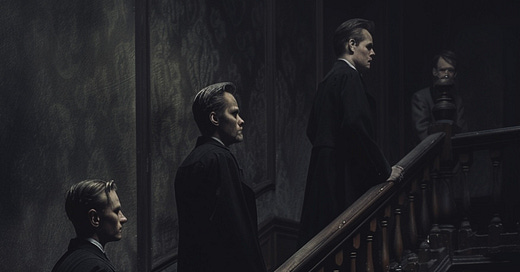



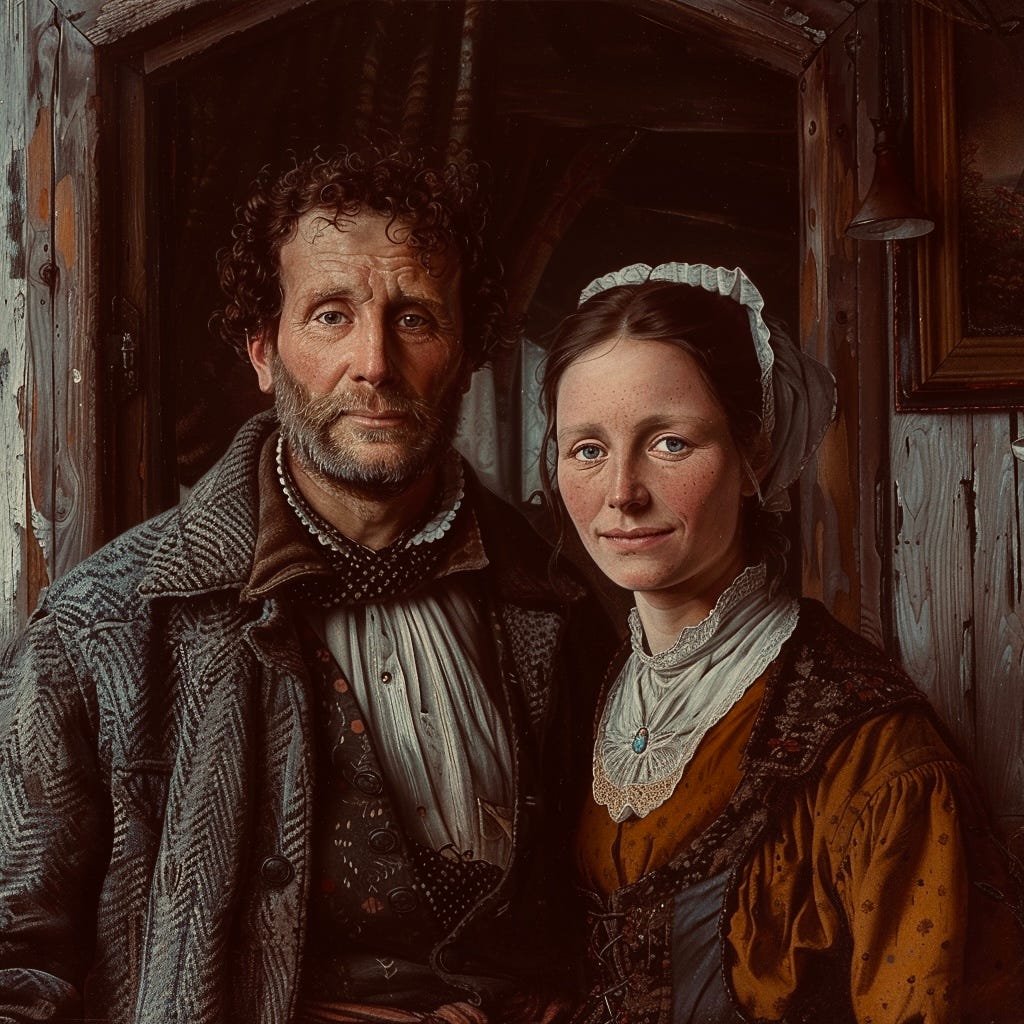

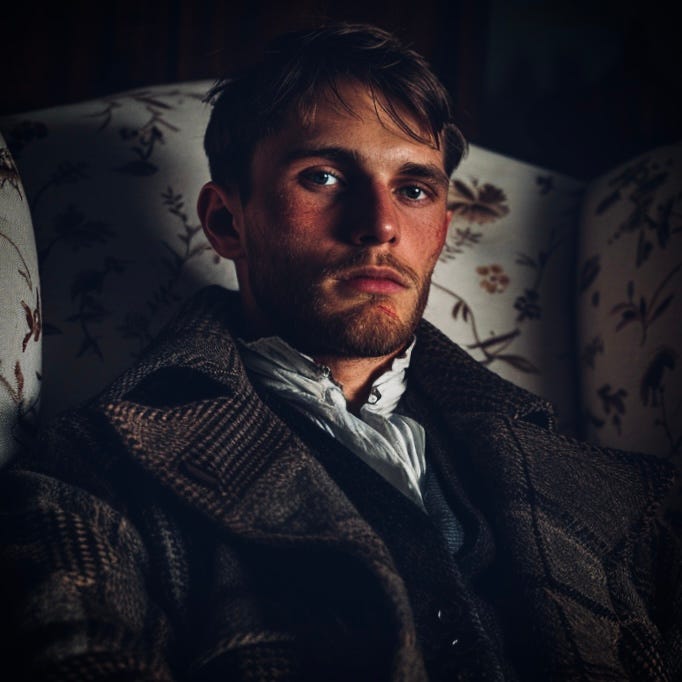
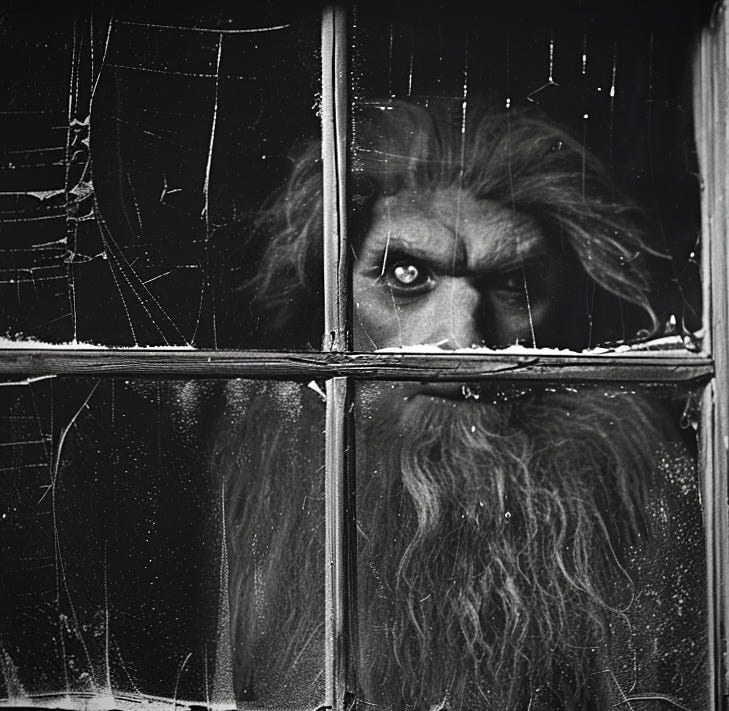

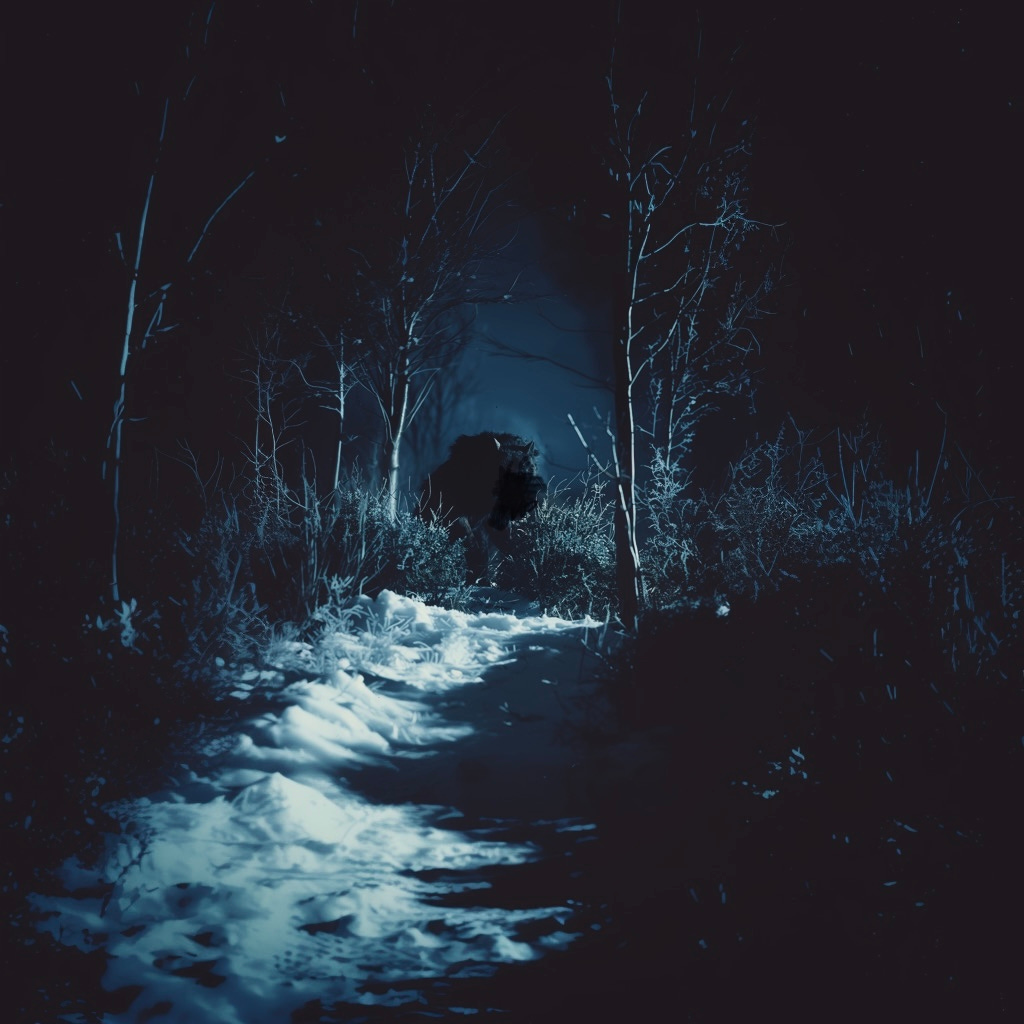

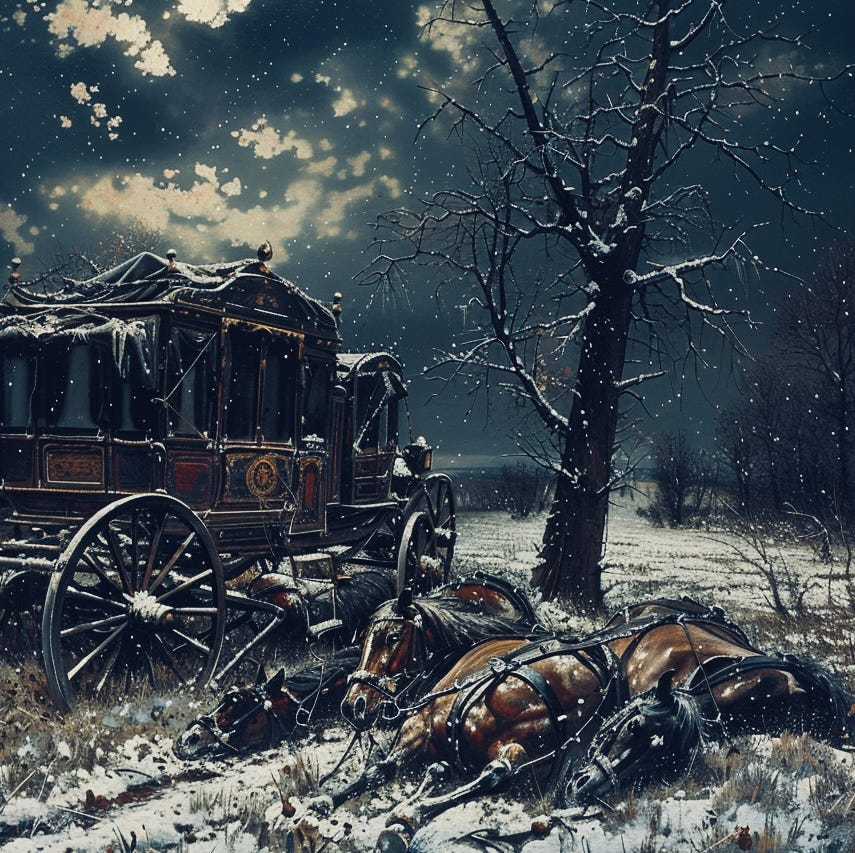
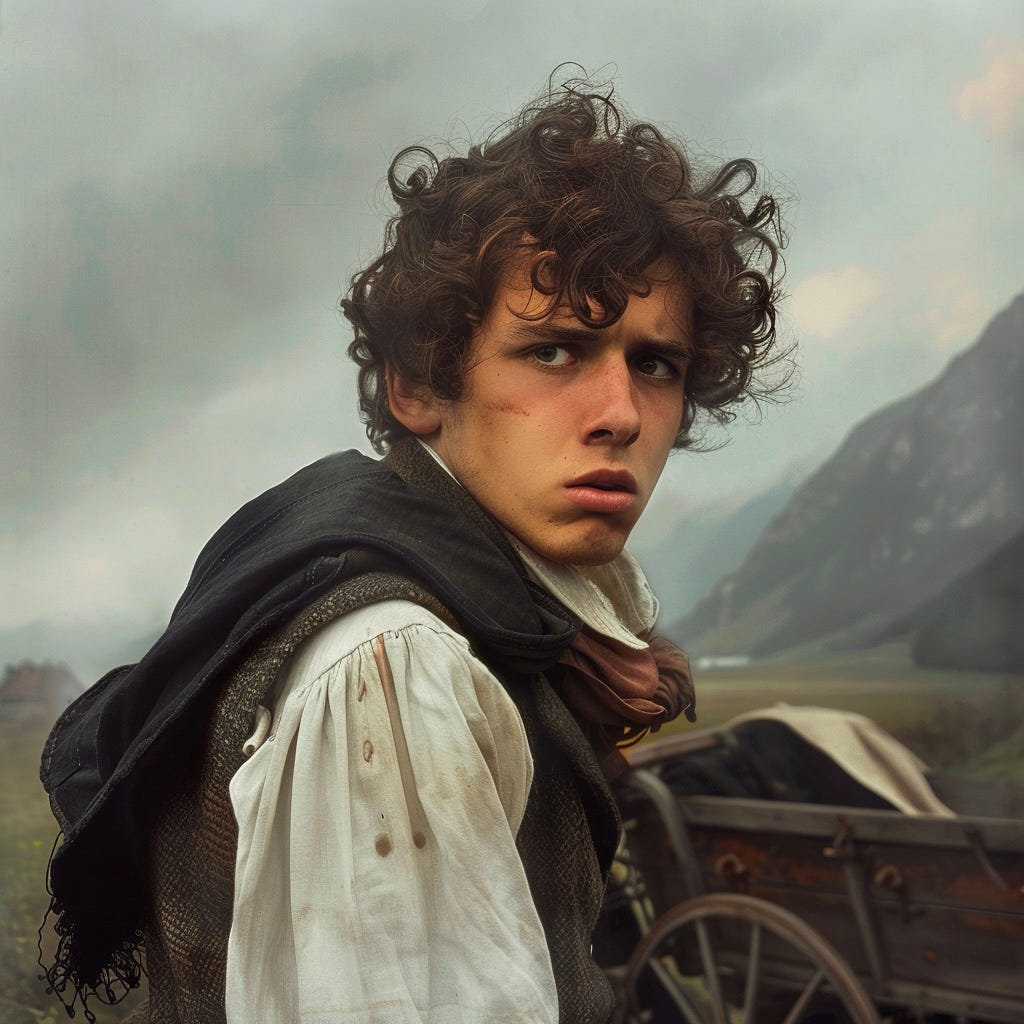
Oh, wow, this is quite a revelation! Curious to see what it means, especially considering the ostler's other revelations. He is such a fascinating character, and I still can't quite get a fix on him. This story continues to surprise—in a good way!
Daniel, in the last three episodes you have laid out quite a bit of detail about the relationships and bias between the individuals living in close quarters at the inn. With the topper being the ostler as a previous neighbor in Hermann's hometown. I anticipate a significant event is right around the corner...